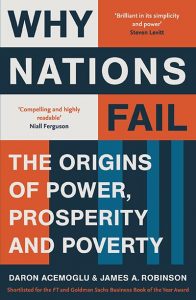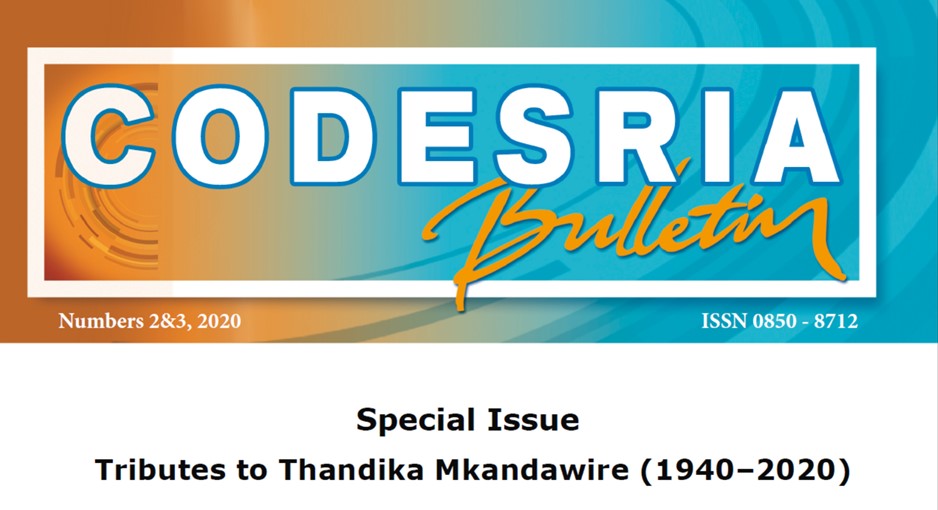Continental research flagship, the Council for the Development of Social Science Research in Africa, (CODESRIA), is out with a combined edition of its Bulletin, dedicated entirely to Prof Thandika Mkandawire who died last March shortly before his 80th birthday anniversary.
With most of the tributes already published somehow, somewhere else, they are not totally new but they are all now collected in one text for the first time as to become a reading material of great currency and relevance across the social sciences and humanities. That is the achievement of the edition.

Prof Steve Sharra with Thandika, the author of the tribute titled “Transcendental Thandika: …

Africa as a provocation in Philosophy
The 84 PDF paged text – CODESRIA Bulletin, Numbers 2 & 3 of 2020 – is an assemblage of voices that defy classification in territorial, gender, class terms or and analytical lenses. All the voices are there: the big names, the not yet so big names in scholarship and activism, gender, ideological and whatever else lenses, all in conversation over a sole subject: Thandika Mkandawire. The coverage encompasses his habits and manners to professional journalism, activism or resistance politics, his intellectual life, his battles, family and death.
Most notable names that can be sighted in the assembly range from Mahmood Mamdani, Jimi Adesina, Yusuf Bangura, Ibbo Mandaza, Issa Shivji, Peter Anyang’ Nyong’o, Eghosa Osaghae, Jomo Kwame Sundaram, Paul Zeleza, Rama Salla Dieng who interviewed Adebayo Olukoshi. Even this is only a sample.
It is impossible to summarise because there is no essay there that hasn’t brought something additional to the table, be it the detailed insights from CODESRIA Executive Secretary, Godwin Murunga, especially his mention of the tension between Marxism and nationalism in Thandika’s radicalism to the beautiful family story as told by Prof Ntombizakhe Mpofu Mlilo to Yusuf Bangura’s systematic review of the Thandika intervention in knowledge, especially as it relates to Thandika’s success in research capacity building as head of CODESRIA, producing that which Nigerian Political Scientist, Jibrin Ibrahim, is credited with naming the end products as ‘CODESRIA Brought Up’. Ex-University of Ibadan Sociologist, Jimi Adesina, continued along this path, citing himself as one such case to the point that he didn’t mind “Tribute to a Mentor and Game-changer” as the sub-title of his piece.
Mahmood Mamdani concludes his by asking us all to go beyond mourning Thandika to learning from him or his life just as Steve Sharra hints in his ‘Transcendental Thandika: how he wished he became a developmental Economist so that he could be a replica of Thandika. a member of the literati wishing to have had a different disciplinary orientation points at how far Thandika must have raised the stakes, the point that is all over Mamadou Diouf’s tribute, full of details from working with Thandika for six years in CODESRIA. Then Eghosa Osaghae’s story of the origin of Thandika’s regard for or acceptance of Nigerian exceptionalism! That is the sort of thing that will excite Nigerians even in their present dreary existence, the very idea that it is only in Nigeria that it is ‘Africa all the way’ even as noisy and chaotic as Nigeria may be. Or could it be Adebayo Olukoshi’s list of his memories of Thandika in the long interview conducted by University of Edinburgh’s Rama Salla Dieng?

Jomo Kwame Sundrama, the Malaysian Economist with two African names,

Asia as interrogation of Why Nations Fail because failure is the other side of success
In other words, while all the tribute writers spoke to Thandika as the all rounder in the values considered crucial to African liberation, there is also that little point in each that is new and different about Thandika in each of the essays. The question of which of the tributes best speaks to the departed is thus completely out of the question. It is the totality of the differential angles buried in each that makes the edition of the Bulletin the text to keep as a collector’s item. This can be said about every other special editions lately on departed icons such as Archie Mafeje, Joseph Ki-zerbo, Samir Amin and all else. Great that they are downloadable. A case for a review essay on these editions on an agreed periodisation would appear to make sense even on the face of it.
Notwithstanding the foregoing, there is something in Kate Meagher’s tribute that warrants reading it more than once, particularly by radical activists whose activism must be informed by the boundary breaking accomplishments of Thandika. It permitted him to criss-cross generations, disciplines, ideologies, hemispheres in Meagher’s tribute. Meagher’s hint about what she calls Thandika’s perceptive iconoclasm, myth-bursting, iconic scholarship and similar qualifiers must interest activist scholars as far as cutting through homogenizing and totalizing narratives and practices that some people invisible without our complicity in doing worry us. There is a sense in which this is what all the tribute writers are recognising in Thandika at the end of the day, a claim that two quotations from Meagher illuminates.
“His eye was on learning from more appropriate development models, borrowed from a variety of successful late development experiences in central Europe, Scandinavia, and East Asia. Development for Thandika was not about copying, but leapfrogging, compressing stages, hybridizing institutions and experimenting in the service of ‘development friendly’ rather than ‘market friendly’ institutions centred on the priorities of African countries rather on those of global investors and neo-liberal policy advisors”.
“He once told a CODESRIA colleague who was searching for a reference to back up a point in an article, ‘You don’t have to cite some Western academic to prove something that you know to be true about your own country. Just write it’

 Nothing can be more decentering of the logocentric wisdom that something must come from a narrativised centre, within and outside Africa, before it can be accepted as authentic. It is not surprising that he could deconstruct what Meagher calls the econometric distortions of Daron Acemoglu and James Robinson whose “dodgy proxies and Manichean notions of ‘good’ and ‘bad’ institutions” he re-contextualised. Acemoglu and Robinson are singled out from Meagher’s list of three because those are the ones whose interesting but misleading book Why Nations Fail is a staple of contemporary political economy.
Nothing can be more decentering of the logocentric wisdom that something must come from a narrativised centre, within and outside Africa, before it can be accepted as authentic. It is not surprising that he could deconstruct what Meagher calls the econometric distortions of Daron Acemoglu and James Robinson whose “dodgy proxies and Manichean notions of ‘good’ and ‘bad’ institutions” he re-contextualised. Acemoglu and Robinson are singled out from Meagher’s list of three because those are the ones whose interesting but misleading book Why Nations Fail is a staple of contemporary political economy.
It is great to learn that Thandika took the text to task from a much more critical standpoint. It is for such reasons that the Bulletin could not have come at a better time, coinciding as it is with the multiple paradoxes defining our time: great quest for emancipatory education at a time powerful interests are bent on narrowing such opportunities; constraining impacts of COVID-19 that, however, embody newer openings and routes to knowledge; greater availability of reading materials at a time interest in reading has been shifting in favour of sound bytes, images and graphic and, lastly, the rising force of decolonization of knowledge at a time of the ascendancy of geopolitics in knowledge production.
This edition, therefore, tallies with the normative and ideational framework underpinning burial ceremonies and memorials: it is for the living rather than for the dead. Mamdani is right in urging us to mourn Thandika less and learn more from him. Those who encountered him in life have interpreted him, the point now is to sing his vision into reality.




























